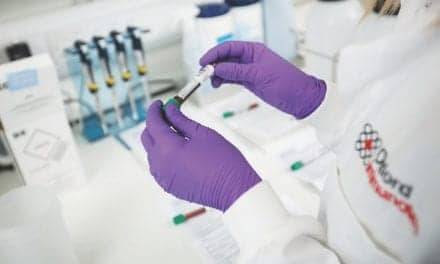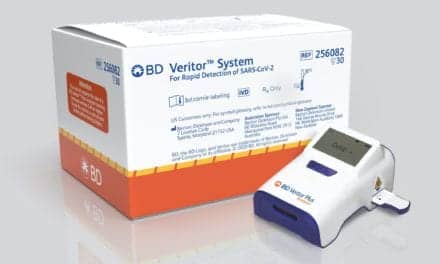FDA has recently granted the first-ever waiver under the Clinical Laboratory Improvement Amendments of 1988 (CLIA) for a rapid screening test for syphilis, which will allow the Syphilis Health Check test to be used in a greater variety of healthcare settings.
Importantly, the waiver allows the test to be performed by untrained healthcare workers in a variety of nontraditional laboratory sites such as emergency departments, health department clinics, community-based organizations, physicians’ offices, and other freestanding counseling and testing locations.
With the issuance of the waiver, the Syphilis Health Check test can be used by more laboratories as an initial screening test or in conjunction with other appropriate laboratory tests and clinical findings to aid in the diagnosis of syphilis infection. However, the test is not intended for use in screening blood or plasma donors.
Syphilis Health Check is a qualitative rapid membrane immunochromatographic assay for the detection of Treponema pallidum (syphilis) antibodies in human whole blood, serum, and plasma. The test, which acts as a screening test, will primarily be performed in a CLIA-waived setting using fingerstick samples of whole blood only, with results being available in as little as 12 minutes. All positive tests should be followed up with further syphilis serological laboratory testing and clinical evaluation before final diagnosis. The rapid result means that if a patient tests positive, a healthcare worker can obtain a second blood sample at the same office visit to confirm the test results through further lab testing. This increases the probability that patients who might not return for a follow-up visit will receive timely treatment.
Syphilis has been identified as a growing disease in the United States. According to the Centers for Disease Control and Prevention (CDC), there are approximately 55,000 new cases of primary and secondary syphilis in the United States each year. This growth is particularly prevalent among men who have sex with men, who now account for more than 75% of all new cases, with an increasing number occurring in the 15 to 24 age bracket. Early detection and treatment is central to limiting the spread of the disease and should help to reduce the risk of additional health issues in those who contract it.
This sexually transmitted infection can cause long-term complications or increase the likelihood of HIV transmission if not adequately treated. The syphilis bacterium can also infect the fetus of a woman during her pregnancy, causing infant death, developmental delays and seizures. CDC recommends that all pregnant women be tested for syphilis at the first prenatal visit. Those who are at high risk, live in areas with high rates of syphilis, or were previously not tested should be tested in the third trimester and again at delivery. CDC also recommends screening at least once a year for syphilis for all sexually active homosexual, bisexual, and other men who have sex with men.
“The broader availability and easier access to this test should contribute to a higher rate of detection of syphilis infection,” says Alberto Gutierrez, PhD, director of the Office of In Vitro Diagnostics and Radiological Health in FDA’s Center for Devices and Radiological Health.
William Smith, executive director of the National Coalition of STD Directors (NCSD), which represents state and local STD public health programs across the country, says “NCSD has been working and advocating for years to bring this product to the wider marketplace that a CLIA waiver makes possible. We have done so because we have a public health emergency on our hands when it comes to increases in syphilis rates and now we have a point-of-care screening device that allows for timely and accurate test results to intervene sooner in people who are infected. It’s a game changer, and we are excited to get this test out into our member health department programs.”
FDA first cleared the Syphilis Health Check test in 2011 and categorized it under CLIA as moderate- and high-complexity. The type of CLIA certificate a laboratory obtains depends upon the complexity of the tests it performs. CLIA regulations describe three levels of test complexity: waived tests, moderate complexity tests, and high complexity tests. The test was intended for use by prescription only to detect Treponema palladium antibodies in serum, plasma, and human whole blood.
FDA granted a waiver under CLIA for the Syphilis Health Check test after the manufacturer submitted data demonstrating the test’s ease of use and accuracy. The agency reviewed data for fingersticks of whole blood samples from 417 subjects collected over the course of 4 months at three testing sites representing typical CLIA-waived sites, such as doctor’s offices. Twelve individuals not trained in the use of the Syphilis Health Check test performed the tests on the study subjects. Results showed that the Syphilis Health Check test, when used by untrained operators, performed with high accuracy. This is critical if the test is to be allowed for use outside of moderate- and high-complexity laboratories.
The Syphilis Health Check test is manufactured by Veda Lab, Alençon, France, for Diagnostics Direct LLC, Cape May Court House, NJ. The test is also distributed by Trinity Biotech USA Inc, Jamestown, NY. The CLIA waiver has been granted to Diagnostics Direct, which is retaining distribution rights for the product to the physician’s office market. Trinity Biotech will be the exclusive distributor for the US public health and hospital markets.
“We are delighted that Syphilis Health Check has been CLIA waived,” says Ronan O’Caoimh, CEO of Trinity Biotech. “This is the only CLIA-waived syphilis test now available in the United States, and will become a major platform in combating the spread of syphilis.”






